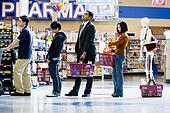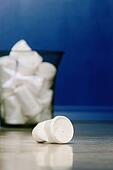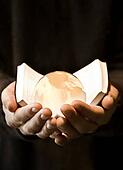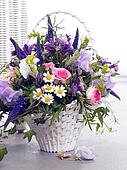By Jim Knowles
In the line at the store, the cashier told the older woman that she should bring her own grocery bag because plastic bags weren’t good for the environment.
 The woman apologized to him and explained, “We didn’t have the green thing back in my day.”
The woman apologized to him and explained, “We didn’t have the green thing back in my day.”
The clerk responded, “That’s our problem today. The former generation did not care enough to save our environment.”
He was right, that generation didn’t have the green thing in its day.
Back then, they returned their milk bottles, soda bottles and beer bottles to the store. The store sent them back to the plant to be washed and sterilized and refilled, so it could use the same bottles over and over.
So they really were recycled.
But they didn’t have the green thing back in that customer’s day.
In her day, they walked up stairs, because they didn’t have an escalator in every store and office building. They walked to the grocery store and didn’t climb into a 300-horsepower machine every time they had to go two blocks.
But she was right. They didn’t have the green thing in her day.
Back then, they washed the baby’s diapers because they didn’t have the throw-away kind. They dried clothes on a line, not in an energy gobbling machine burning up 220 volts – wind and solar power really did dry the clothes.
Kids got hand-me-down clothes from their brothers or sisters, not always brand-new clothing.
But that old lady is right, they didn’t have the green thing back in her day.
Back then, they had one TV, or radio, in the house – not a TV in every room. And the TV had a small screen the size of a hankerchief, not a screen the size of the state of Montana. 
In the kitchen, they blended and stirred by hand because they didn’t have electric machines to do everything for you.
When they packaged a fragile item to send in the mail, they used a wadded up old newspaper to cushion it, not styrofoam or plastic bubble wrap.
Back then, they didn’t fire up an engine and burn gasoline just to cut the lawn. They used a push mower that ran on human power. They exercised by working so they didn’t need to go to a health club to run on treadmills that operate on electricity.
But she’s right, they didn’t have the green thing back then.
 They drank from a fountain when they were thirsty instead of using a cup or a plastic bottle every time they had a drink of water. They refilled their writing pens with ink instead of buying a new pen, and they replaced the razor blades in a razor instead of throwing away the whole razor just because the blade got dull.
They drank from a fountain when they were thirsty instead of using a cup or a plastic bottle every time they had a drink of water. They refilled their writing pens with ink instead of buying a new pen, and they replaced the razor blades in a razor instead of throwing away the whole razor just because the blade got dull.
But they didn’t have the green thing back then.
Back then, people took the streetcar or a bus and kids rode their bikes to school or rode the school bus instead of turning their moms into a 24-hour taxi service. They had one electrical outlet in a room, not an entire bank of sockets to power a dozen appliances. And they didn’t need a computerized gadget to receive a signal beamed from satellites 2,000 miles out in space in order to find the nearest pizza joint.
But isn’t it sad the current generation laments how wasteful the old folks were just because they didn’t have the green thing back then?
Donna Calvin comments about Mr. Knowles article…
“We Were Green When It Was Called “Not Being Wasteful.”
When I was growing up in my parents house, my mother taught my sister and me not to be wasteful. Today it’s called being “green.”
I really don’t like the word “green”. “Green” is a political term and part of a political agenda I strongly oppose. The “green” movement is political correctness gone a muck and, frankly, I loathe PC. PC is the political religion of the left, comprised of atheism, agnostics, humanists and others who never had honest-to-goodness, solidly-based, strict Bible training sitting at the feet of their parents and good Bible-preaching-teaching pastors.
When I was growing up in my parents house, my mother taught my sister and me not to be wasteful. I was taught:
- That being wasteful was a sin and it hurt Jesus.
- Not to waste anything!
- To shut off the lights when I left the room.
- To use only the amount of paper I needed to do a homework assignment.
- To shut off the water and not leave it run when not in direct use.
- To use cold water, not hot, if hot wasn’t necessary.
- To keep the heat lower at night to save money.
- To not stand in front of the refrigerator with the door open.
- To immediately shut the door, to not stand in a doorway and talk to my friends.
- To shut off the TV when I left the room (when we finally got one).
- To take only the amount of food I was going to eat on my plate. Seconds, thirds and fourths were always available, so nothing should go from my plate into the garbage pail (that, BTW, was lined with a brown grocery bag). Take only a small portion, add a little more if desired.
- Our organic refuge, like peelings, egg shells, etc., became the fertilizer to grow next year’s vegetables. My dad buried organic garbage in the back-yard garden. (We do the same in our yard today.)
- That I shouldn’t waste anything, because whatever I wasn’t spending on wastefulness, that money could be given to do the Lord’s work.
- The saying: “Waste not, want not!” was a truism to believe in and live by and Jesus taught that ideal.
- Don’t make extra dishes. Use as few pots as possible to cook in. Use as few dishes as possible to eat from and be wise in choosing utensils to cook with and eat from. Why? To save dishwater and dish soap and clean up time and effort.
- Change from my good school clothes and good shoes upon coming home every day to older outdoor play clothes.
- Be extra careful in my extra good Sunday-going-to-Church clothes!
- Rags were turned into throw rugs and later, when plastic bags came on the scene, they too eventually became throw rugs.
- My mother mended socks when they got a hole in them! She taught me how to sew on buttons. She had a bag full of buttons she cut off clothes too old to be useful for anything except the ragbag.
- My mother made her house dresses from the material of chicken feed bags. We lived in a suburb, but yes, we had chickens. So do most of our neighbors.
- To always live simply and with attention paid to thriftiness.
- Lend to those who needed it.
- Give abundantly to those in need and to those who did the Lord’s Work.
- To never hold back personal resources from God’s Christian Church!
My parents lived that kind of life. I never saw them go hungry. I never knew them to pay a bill late. There was never anything we didn’t have that we needed. They lent money to almost every relative in the family often without ever being paid back. They gave with joy to the church they attended. And they taught me to do the same.
My parents are home with Jesus now, they lived several years beyond the 70 promised by the Lord for living a godly life. They were never green. They were just simple, salt-of-the-earth, wonderful folks who lived a clean, holy, thrifty, honest, faithful Christian life, the natural outcome of the life attained by daily Bible-reading, attending Church regularly, being “Doers of the Word,” following their beloved Master, the Lord Jesus Christ.
Wrap the world in HIS WORD, THE HOLY BIBLE, right from the Hand of God and there won’t be any need for green.

